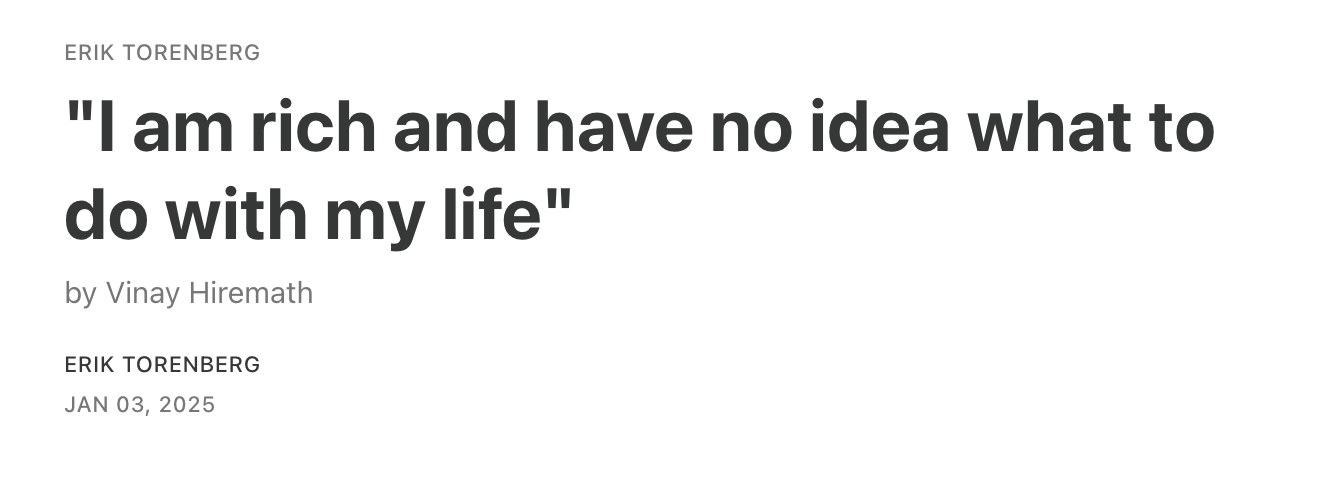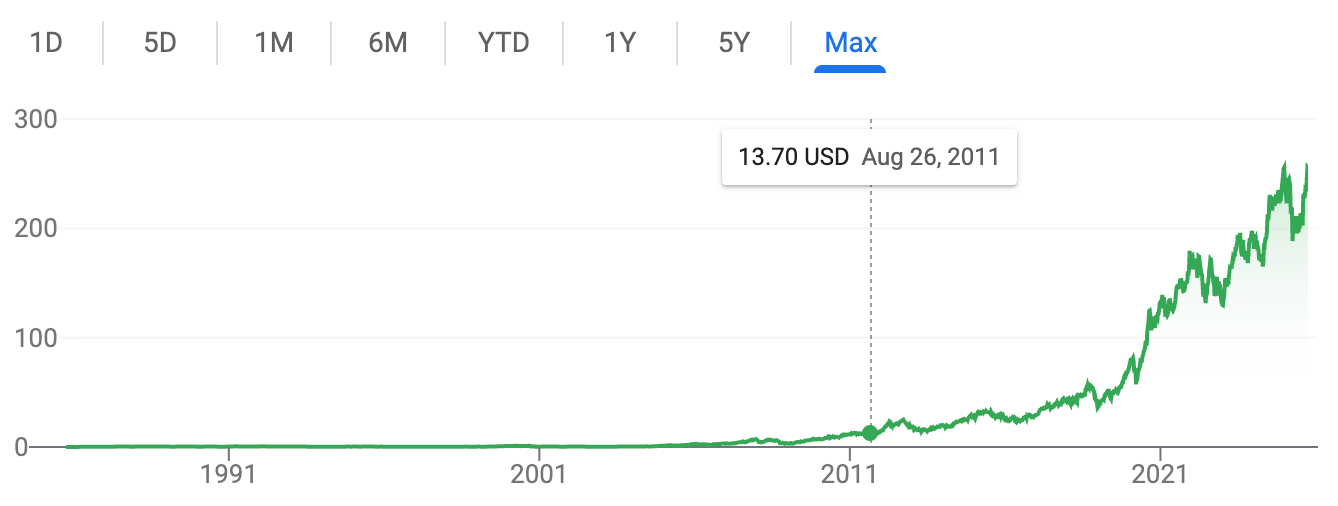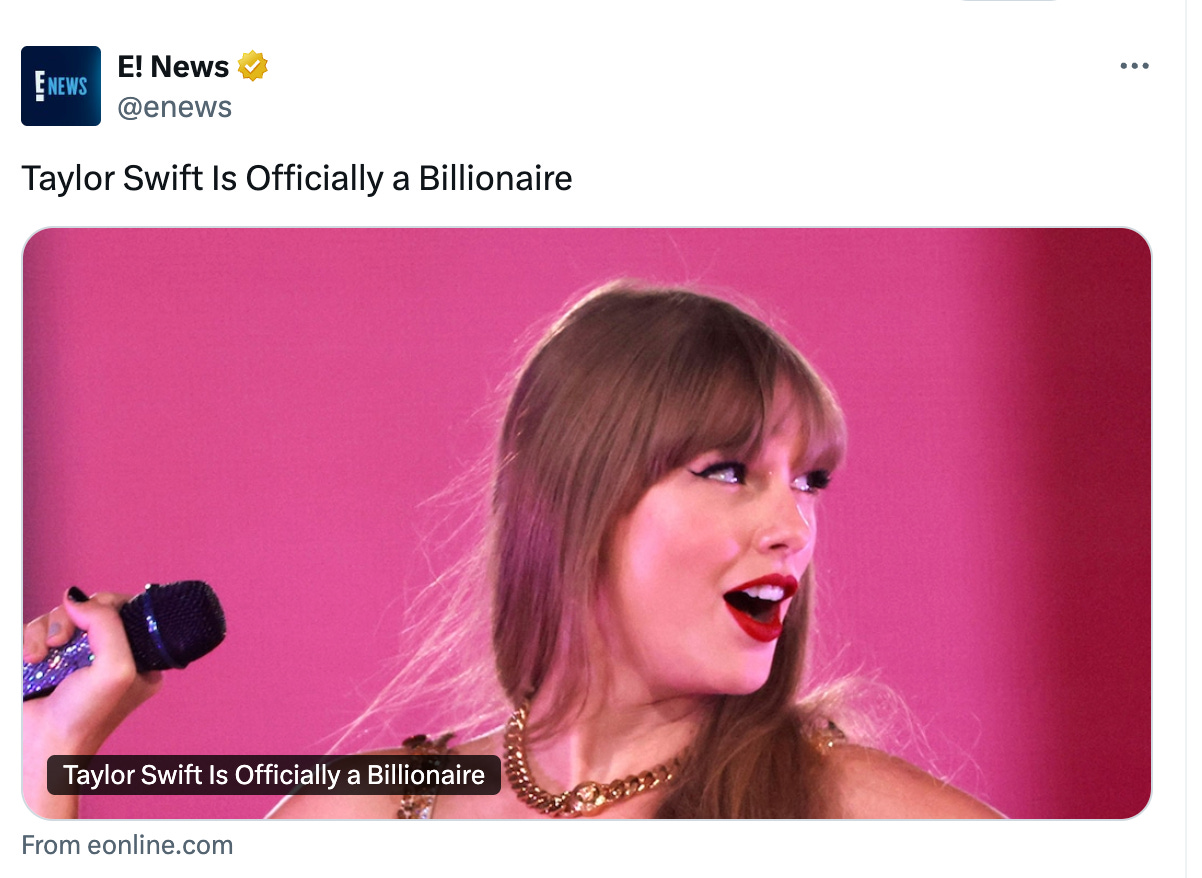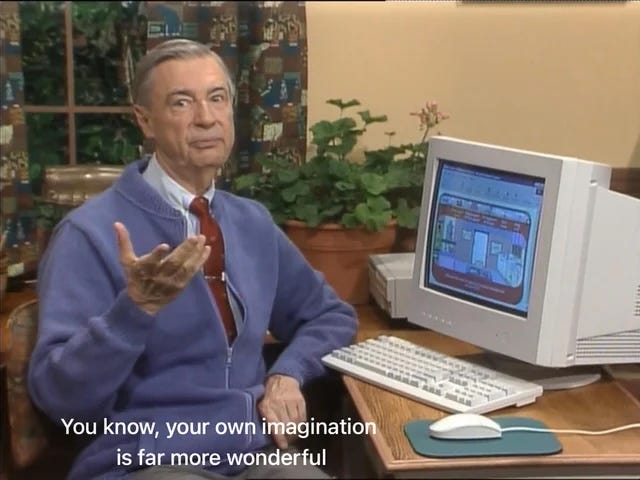Imagine something more interesting than being rich
How to get out of a growth mindset.
When did children start dreaming of being billionaires when they grow up?
Why does everyone want to get rich? What are you going to do when you do get rich? Is there a point when you will feel you have enough and can start doing those things?
Our whole society feels based around this idea of more. Everything needs to be more. Needs to be bigger. Needs to be growing. Why is this?
We are suffering from a lack of imagination. I suspect, for most people, if they were to sit down and picture what their ideal life would be it wouldn’t require nearly the amount of capital they are striving to acquire. They would find they are overly focused on the means and not the end. In their heart of hearts people know that there is not a deep happiness to be found on the deck of a yacht or in the glove compartment of a Maserati. And ironically they may be missing their chance at a fulfilling life in their relentless pursuit of overshooting what they need to achieve it.
However, this lack of imagination is systemic. It doesn’t exist solely as some kind of moral failing of the individual. It is built into American culture and pervades everything even at the institutional level. Let’s take a look.
Maximizing shareholder value
Why can’t you just be happy as a big company? Why does Meta need to keep finding ways to extract more attention from its users and turn that into more ad revenue for themselves? Couldn’t they have better served society by just being a good place to stay in touch with people you know? Why do we live in a world where it would be thought of as bad business for them to just focus on making Instagram the best possible way to share photos with your friends?
The answer is obviously in the obligation to the shareholders. It is against the law for a public company to not act in the interest of its shareholders. The shareholders interest in this case is not complicated, it’s just more money. I have not found an instance where shareholders have urged the stewards of a business to do something cool or creative or beneficial to society if it did not directly fall upon the path to higher earnings per share.
As a result you have this predictability. These companies that capture the public’s imagination (to gain a user base) and then without fail turn into some sort of ad platform.
They don’t have to do this to survive. They have to do this to forever increase their value. Because in our shareholder centric version of capitalism, the only thing a company is capable of imagining is being the biggest. It’s hard to imagine a world that is any different.
But if you really use your imagination it is possible.
Things like Wikipedia are a good example. Unreliant on investors, wikipedia is free to be the most beneficial version of itself. It is something that someone wanted to see in the world and they made it happen. It is not striving to optimize for anything that is in conflict with what makes it good. This is what is possible with imagination when it is decoupled from growth for the sake growth.
Another good example is Apple. Apple has two reputations and they come from two distinct eras of leadership.
There is Apple the innovator. Look at all these space age machines we have. Starting with the see through computer (iMac) and then 10,000 songs in your pocket (iPod) and then the device that changed the world (iPhone). Apple is or was a company that ushered in the future. This was Steve Jobs’ Apple. The Apple of “Think Different.”
Then there is Apple the behemoth. The largest company in the world on most days. The Apple that is worth trillions of dollars. Even their relatively unknown asset management arm they use to manage their massive cash reserves has nearly $300 billion under management, which would make it the largest hedge fund in the world if it were open to outside investors. This is Tim Cook’s Apple.
Rather than imagining how cool the future can look like, it feels a bit like he is better at imagining how big Apple can be (and he’s very good at that).
But I doubt that a move away from earnings calls and quarterly reports is coming any time soon. So maybe the institutional side of unimaginative growth isn’t going anywhere, but what about the ways in which that has permeated our personal mentalities?
Maximizing ourselves
Let me start off by saying: I am not so out of tough that I don’t understand why people are so intent on making a lot of money. I know that it feels vital in America to have a large cushion. We are a country with no safety nets and a very rigid class system. Unlike many other places, falling in socioeconomic class doesn’t just mean you will live in a smaller house or have to thrift your clothes, it means you are literally in danger.
But if you look at our culture for just a second and the people we put on pedestals, you will see that we are not all just striving to build a safety net or a little cushion to ensure we don’t end up in a neighborhood with more gunshots than bird songs. We are treating ourselves like public companies. Growth for the sake of growth.
We attach money to everything. Google will often suggest you append “net worth” to the end of any search for a notable person. Children have moved on from talking about their favorite players’ stats to their contract values. People celebrate when their favorite celebrity becomes a billionaire.
Now I am not anti-capital. I am not an “eat the rich” guy by any stretch. But I think it’s a little boring how we treat it as the be all end all of all things. To me it reflects an extreme lack of imagination of what success can look like. Does making a billion dollars make Taylor Swift the best at music? Of course not. When we introduce money as this measure of all things, that were never meant to be measured monetarily, then we kind of ruin it.
Mr. Beast creates strange and ethically-ambiguous game shows that no TV network could ever air. That’s interesting. The fact that he’s a billionaire is not.
But I digress. What does this have to do with you or me? I am not Taylor Swift and I am guessing you are not Mr. Beast (if you are, hi, my dad is a big fan!).
Why are we so intent on maximizing our revenue? Is it the only game in town? Feels like it sometimes.
It often feels like so many choices in our careers are made around what will pay the most money. The idea being that money will bring us freedom so we can have a more fun life. But ironically we are sacrificing our freedom in service of this pursuit.
Consider the classic dinner party question: if every job paid the same, what would you do for work? It’s almost never the job you are doing. I mean how high up would your job be on the list of ones you would do if all jobs paid the same? Also, as implied by the wording of the question, most people would not pick a job that ordinarily pays more than their current job. I can’t imagine a lot of elementary school teachers would choose to be CEO of Amazon if it paid the same.
So we are narrowing our options to optimize for the highest income. Not a groundbreaking revelation. But still kind of strange as it compounds. Every decision we make getting further away from the things that make us happy in pursuit of a currency that we hope will potentially unlock the happiness we missed sometime in the indeterminate future.
It’s why that proverb of the Mexican fisherman resonates so much.
An American investment banker was at the pier of a small coastal Mexican village when a small boat with just one fisherman docked. Inside the small boat were several large yellowfin tuna. The American complimented the Mexican on the quality of his fish and asked how long it took to catch them.
The Mexican replied, “only a little while.”
The American then asked why didn’t he stay out longer and catch more fish?
The Mexican said he had enough to support his family’s immediate needs.
The American then asked, “but what do you do with the rest of your time?”
The Mexican fisherman said, “I sleep late, fish a little, play with my children, take siestas with my wife, Maria, and stroll into the village each evening where I sip wine, and play guitar with my amigos. I have a full and busy life.”
The American scoffed. “I have an MBA from Harvard, and can help you,” he said. “You should spend more time fishing, and with the proceeds, buy a bigger boat. With the proceeds from the bigger boat, you could buy several boats, and eventually you would have a fleet of fishing boats. Instead of selling your catch to a middle-man, you could sell directly to the processor, eventually opening up your own cannery. You could control the product, processing, and distribution,” he said. “Of course, you would need to leave this small coastal fishing village and move to Mexico City, then Los Angeles, and eventually to New York City, where you will run your expanding enterprise.”
The Mexican fisherman asked, “But, how long will this all take?”
To which the American replied, “Oh, 15 to 20 years or so.”
“But what then?” asked the Mexican.
The American laughed and said, “That’s the best part. When the time was right, you would announce an IPO, and sell your company stock to the public and become very rich. You would make millions!”
“Millions – then what?”
The American said, “Then you could retire. Move to a small coastal fishing village where you could sleep late, fish a little, play with your kids, take siestas with your wife, and stroll to the village in the evenings where you could sip wine and play guitar with your amigos.”
Imagination can unlock happiness faster than money
What’s the solution? Take some time to imagine how you want your life to be. What are the things you value? What does a perfect day feel like? If you aren’t sure, then whenever you end your day and think to yourself “that was a really great day” write down what you did and what made it so great. Do the same thing when you have day that sucks. Then do more of the things that lead to the great days and eliminate the things from your life that lead to the shitty days. It is really simple.
You may need a lot less money than you think to live the kind of life you want to live. You may be able to exit the hamster wheel, step off the treadmill, exit the rat race, whatever you want to call it.
Sit down and imagine a good life. It may be very different than the one you currently live. It may not be more expensive though.
I don’t monetize my substack. I like to share my thoughts and I am happy when people enjoy my thoughts even though it changes nothing about my bank account. So if you like my thoughts please share and subscribe.









I don't think most people I know want to be billionaires. When people say they wish they were rich they mean in a, enough so money isn't a concern way. Most people just want financial security and the spare change to have the freedom to explore their interests. So many people would be able to do what actually interests them if it wasn't due to a lack of money.
Recently subscribed, and I'm really enjoying your writing!